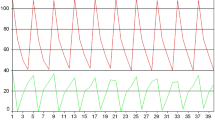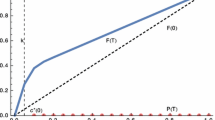Abstract
In this paper, we investigate processes involving iterative information updating due to van Benthem (Int Game Theory Rev 9:13–45, 2007), who characterized existent game-theoretic solution concepts by such processes in the framework of Plaza’s public announcement logic. We refine this approach and clarify the relationship between stable strategies and information update processes. After extending Plaza’s logic, we then derive the conditions under which a stable outcome is determined independently of the order of the iterative information updates. This result gives an epistemic foundation for the order independence of iterated elimination of disadvantageous strategies.
Similar content being viewed by others
References
Bernheim D. (1984) Rationalizable strategic behavior. Econometrica 52: 1007–1028
Gale D. (1953) A theory of n-person game with perfect information. Proceedings of the National Academy of Sciences of the United States of America 39(6): 496–501
Gale D., Kuhn H. W., Tucker A.W. (1950) Reduction of game matrices. In: Kuhn H.W., Tucker A.W. (eds) Lectures on the theory of games, annals of mathematics studies (Vol. 37). Princeton University Press, Princeton, pp 89–96
Gerbrandy J. (1999) Dynamic epistemic logic. Logic, Language and Computation 2: 67–84
Gilboa I., Kalai E., Zemel E. (1990) On the order of eliminating dominated strategies. Operations Research Letters 9: 85–89
Luce R. D., Raiffa H. (1957) Games and decisions: Introduction and critical survey. Wiley, New York
Pearce D. (1984) Rationalizable strategic behavior and the problem of perfection. Econometrica 52: 1029–1050
Plaza, J. (1989). Logic of public communications. In 4th international symposium on methodologies for intelligent systems (pp. 201–216). (Reprinted version is in Synthese, 158, 165–179, 2007).
Samuelson L. (1992) Dominated strategies and common knowledge. Games and Economic Behavior 4(2): 284–313
Tan T. C., Werlang S. R. (1988) The Bayesian foundations of solution concepts of games. Journal of Economic Theory 45(2): 370–391
van Benthem, J. (2002).“One is a lonely number”: Logic and communication. Technical Report ILLC, University of Amsterdam, Report PP-2002-27.
van Benthem J. (2007) Rational dynamics and epistemic logic in games. International Game Theory Review 9: 13–45
van Benthem J., van Eijck J., Kooi B. P. (2006) Logics of communication and change. Information and Computation 204(11): 1620–1662
van der Ditmarsch, H. P., van der Hoek, W., & Kooi, W. B. (2005). Dynamic epistemic logic with assignment. In Proceedings of the fourth international joint conference on Autonomous Agents and Multi-Agent Systems (AAMAS 05) (pp. 141–148). New York: ACM Inc.
van der Ditmarsch H. P., van der Hoek W., Kooi W. B. (2007) Dynamic epistemic logic. Springer, The Netherlands
Author information
Authors and Affiliations
Corresponding author
Additional information
An erratum to this article can be found at http://dx.doi.org/10.1007/s11229-010-9858-4
Rights and permissions
About this article
Cite this article
Masuzawa, T., Hasebe, K. Iterative information update and stability of strategies. Synthese 179 (Suppl 1), 87–102 (2011). https://doi.org/10.1007/s11229-010-9835-y
Received:
Accepted:
Published:
Issue Date:
DOI: https://doi.org/10.1007/s11229-010-9835-y




